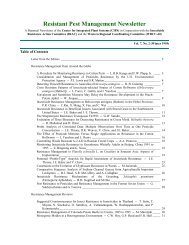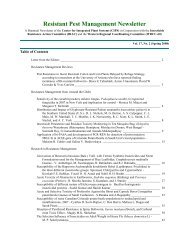Vol.12_No.2 - Pesticide Alternatives Lab - Michigan State University
Vol.12_No.2 - Pesticide Alternatives Lab - Michigan State University
Vol.12_No.2 - Pesticide Alternatives Lab - Michigan State University
You also want an ePaper? Increase the reach of your titles
YUMPU automatically turns print PDFs into web optimized ePapers that Google loves.
SymposiaCAST <strong>Pesticide</strong> Resistance Management Symposium Provides Cross-Disciplinary DialogueThe Council for Agricultural Science andTechnology (CAST) held a two-day symposium onApril 10-11, 2003 in Indianapolis, Indiana, entitled"Management of Pest Resistance: Strategies UsingCrop Management, Biotechnology, and <strong>Pesticide</strong>s."CAST is a nonprofit organization composed of 38scientific societies and many individual, student,company, nonprofit, and associate society members.CAST assembles, interprets, and communicatesscience-based information regionally, nationally, andinternationally on food, fiber, agricultural, naturalresource, and related societal and environmental issuesto our stakeholders - legislators, regulators,policymakers, the media, the private sector, and thepublic.This symposium provided a cross-disciplinaryapproach to management of pest resistance and broughttogether 120 professionals concerned with resistancemanagement involving pathogens, insect pests, andweeds. There were representatives from the pesticideindustry, seed companies, extension, academia, stateand federal government (U.S. and Canada), pesticideeducation, consulting agencies, and growerorganizations.The overall goal of the symposium was to providea collective framework in which more proactiveresistance management could be developed in thefuture. The major objectives of the symposium were to:1. identify the common issues related to pesticideresistance management across disciplines;2. identify ways to remove barriers that preventproactive resistance management;3. provide opportunities for future discussions onpesticide resistance management;4. identify future research activities in resistancemanagement; and5. provide this information to lawmakers and federalagencies, especially the United <strong>State</strong>sEnvironmental Protection Agency (EPA) and theUnited <strong>State</strong>s Department of Agriculture (USDA),academia, extension, industry, consulting agencies,and the public.Forty-seven speakers from industry, academia,extension, consulting agencies, federal and stategovernment, grower organizations, and public interestgroups gave presentations at the Symposium. Most ofthese presentations will be available on-line at theCAST website (http://www.cast-science.org). Thesymposium agenda was developed by a steeringcommittee consisting of representatives from USDA,EPA, industry (Resistance Action Committees),academia, public interest groups, and growerorganizations. The agenda is available at the CASTweb site. The Symposium was organized into thefollowing eight sessions:1. Scope of North American Pest ResistanceProblems in 20032. Issues in Pest Resistance Management3. Lessons Learned I: Balance between Industry,Academia, Users, and Regulators4. Lessons Learned II: Have Models Helped?5. Role of Stakeholders6. Lessons Learned III: How Can We Work toAlleviate Barriers to Comprehensive ResistanceManagement Implementation? How Can We WorkTogether Better?7. Pest Resistance Management Goals8. Symposium Recommendations for Pest ResistanceManagement - Where to Now?The symposium provided a fruitful opportunity forall stakeholders involved in insect, weed, and pathogenpest management to come together to discuss issuesand lay the foundation for future collaborations toaddress pest resistance management. Several majorinterest areas were explored:1. targeting research funding for pest resistancemanagement with federal competitive grantprograms;2. improving pesticide education programs to addresspest resistance management;3. improving transparency of the EPA's regulation ofpesticide resistance management;4. evaluating of potential economic impacts of pestresistance management;5. targeting consumer education programs on the useof reduced risk pesticides, resistance management,and the cost of producing quality food in themarketplace;6. standardizing of definitions for resistance, methodsof resistance documentation, etc.;7. focusing on goals of resistance monitoringprograms; and8. changing national farm policy to better fundresearch and education for resistance management.Stakeholders agreed that proactive resistancemanagement is a desirable goal, but the path to reachthis goal is unclear.CAST is in the process of developing an on-lineProceedings of the Symposium that should be availableon the CAST website in Fall 2003








